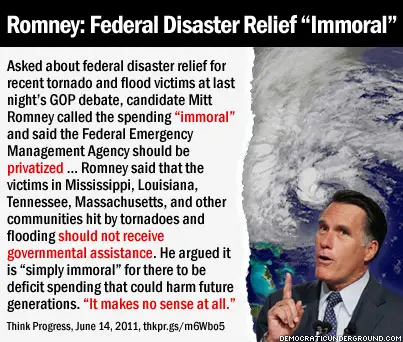
The most Remarkable characteristic of this campaign is that democrats are not even tempted to make stuff up.
The reality of Romney's gyrations, flip flopping wildly from one strand of linguine to another is more fertile ground that democratic propagandists could invent.
Sure, there' is some serious "spinning" on the left side of the aisle but none of the whole cloth lies that prompted Chrysler's ceo to call Romney's allegations of Jeep outsourcing "Extravagant fantasies."
Sketchy's campaign depends existentially on america's eagerness to be told fictional nonsense.
http://thenewcivilrightsmovement.com/chrysler-calls-romneys-auto-industry-lies-extravagant-fantasies/politics/2012/10/28/52492
Here's GM's Denunciation of Romney's Lies About Auto bailout
http://paxonbothhouses.blogspot.com/2012/11/gm-and-chrysler-rebut-romney-auto.html
Here's GM's Denunciation of Romney's Lies About Auto bailout
http://paxonbothhouses.blogspot.com/2012/11/gm-and-chrysler-rebut-romney-auto.html
***
After the winds and waves of Hurricane Sandy tore apart chunks of the Atlantic coast, they exposed a fundamental difference between President Obama and Republican challenger Mitt Romney.
Obama will be swiftly shipping federal relief dollars to devastated communities. Romney once suggested he would reduce those federal programs and shift control of emergency management to the states. Funding programs such as disaster relief is “immoral,” he said, if it means adding to the debt. Post-Sandy, he is softening his tone.
In the abstract, Romney’s original message is a popular one. He’s against big government and for deficit reduction. But when reality strikes in the form of a monster tidal surge that floods homes, businesses, and subway stations, the Romney message is a cold and discomfiting one.
It’s not exactly “drop dead,” as the New York Daily News once famously characterized President Gerald Ford’s resistance to federal bailout money for New York City. It’s more like: New York, you’re on your own. So are you, New Jersey.
In the meantime, let's collect boxes of macaroni and cheese to send to Sandy’s victims.
Charity is noble, but it’s quite a different concept from “we’re all in this together as taxpayers and fellow Americans.”
Romney’s philosophy on disaster relief parallels his view on health insurance. Obamacare is bad. Leave it to the states to come up with their own version of health care reform. And that same state-centered philosophy shapes his response on other issues. When the Supreme Court invalidated part of Arizona’s tough immigration policy, Romney defended it generally under the rubric of states’ rights. On abortion rights, he has said Roe v. Wade should be reversed to allow states to decide that issue. And he has proposed more state versus federal regulation of energy.
If Romney believes the answer to such issues lies with the states, he’s running for the wrong office. He should be running for governor again. But one term was enough for him. He has big dreams for himself, even if his view of government is small.
Just how small government should be must now be weighed against the massive swath of destruction left by Hurricane Sandy.
Romney’s response to a question from CNN moderator John King during a June 2011 primary debate is turning into a key Obama campaign talking point. Asked whether emergency management should be returned to the states, Romney said, “Absolutely. Every time you have an occasion to take something from the federal government and send it back to the states, that’s the right direction. And if you can go even further and send it back to the private sector, that’s even better.”
Pressed for response after Sandy struck, Romney first ducked, then modified his earlier view: “I believe that FEMA plays a key role in working with states and localities to prepare for and respond to natural disasters,” said Romney through a campaign statement. “As president, I will ensure FEMA has the funding it needs to fulfill its mission, while directing maximum resources to the first responders who work tirelessly to help those in need, because states and localities are in the best position to get aid to the individuals and communities affected by natural disasters.”
By now, Romney’s chameleon-extraordinaire routine should be no surprise. He changes as much as political circumstances require. Failing to understand Romney’s tremendous capacity for change was Obama’s second biggest mistake. His first was failing to show up for their first debate. But now, Obama has a new window of opportunity against a relentless rival.
His chance to look presidential has been noted since Sandy started stalking the East Coast. But beyond offering the optics of leadership, Sandy provides a lesson in two starkly different philosophies of government.
FEMA has been rightly criticized for past gross inefficiency, but this time the system is working. So said Republican Governor Chris Christie of New Jersey, one of Obama’s loudest critics.
Now, Christie is giving Obama credit for leadership and telling Fox News: “If you think right now I give a damn about presidential politics, then you don’t know me.” As governor, what Christie cares about is the feeling that we’re all in it together as a country, as opposed to the feeling that every state is on its own.

No comments:
Post a Comment